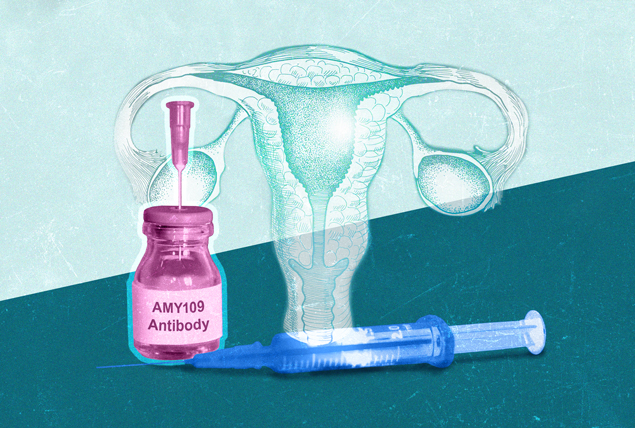Monthly Antibody Injection May Help Control Endometriosis, Study Says

Endometriosis affects 1 in 10 women during their reproductive years. The disease occurs when tissue that usually lines the uterus—endometrium-like tissue—grows on other parts of the body.
"The bleeding and breakdown from endometriosis cause scar tissue to form, which are called adhesions," said Monte Swarup, M.D., an OB-GYN in the Phoenix area and the founder of Vaginal Health Hub. "The adhesions cause organs to stick together. This can cause pain before and while menstruating."
In addition to pain, many people with endometriosis suffer from infertility. Others experience no symptoms at all, according to Dan Martin, M.D., the scientific and medical director of the Endometriosis Foundation of America.
Alternatives to surgery being investigated include dietary measures, lifestyle modification, hormone suppression and antioxidants, among others.
The exact cause of endometriosis is unknown, and there is no known cure, Martin said.
"Current treatments for endometriosis aim to manage the symptoms or remove the lesions," Martin said. "That may include pain medication, anti-inflammatory medication, hormonal suppressive therapy or surgery."
Traditionally, endometriosis treatments have focused on alleviating the symptoms of endometriosis, such as providing pain relief from the side effects of the condition, rather than modifying the disease.
However, new research from Japan could lead to the first disease-modifying treatment for endometriosis. It could potentially provide long-term relief for millions of women hoping to reduce pelvic pain and improve symptoms.
The study found a monthly antibody injection can reduce the size of lesions, scar tissue and adhesions in monkeys with endometriosis.
About the study
For the 2023 study, researchers developed an antibody dubbed "AMY109" that binds to a signaling molecule called interleukin-8 (IL-8).
IL-8 is a protein that has a role in inflammation and immune response. According to some research, IL-8 levels are elevated in women with endometriosis, and it may be involved in the growth and development of endometrium-like tissue outside the uterus.
The researchers developed the AMY109 antibody to function like an IL-8 garbage collector, said study author Ayako Nishimoto-Kakiuchi, speaking to ScienceNews. The antibody collects IL-8 and delivers it to the cell’s waste disposal center, she explained.
The researchers tested AMY109 in cynomolgus monkeys who either had developed endometriosis spontaneously or had endometriosis surgically induced. They provided the monkeys with an AMY109 injection once a month for six months.
The results
The monthly AMY109 injection improved endometriosis in monkeys, reducing the number of lesions and diminishing adhesions and fibrosis, or scar tissue.
"This was a rather unexpected result, because multiple factors could contribute to fibrosis," the researchers wrote. Importantly, the AMY109 antibody injection did not impact the hormone secretion or menstrual cycle of the monkeys.
Interpreting the results
"AMY109 may represent a disease-modifying therapy for patients with endometriosis," the study authors wrote.
The researchers have begun a phase 1 clinical trial to test the safety of the injection in humans, Nishimoto-Kakiuchi said.
However, Martin said we are a long way off before the treatment could potentially be approved for human use.
"The research to conclude something in humans is three to 10 years off at best," said Martin, who was not involved in the study. "Further research is needed to determine if these findings can be duplicated in humans and to determine safety and effectiveness."
The bottom line
Effective treatments for endometriosis are currently being researched, according to Martin. Alternatives to surgery being investigated include dietary measures, lifestyle modification, hormone suppression and antioxidants, among others, he said.
Swarup named dichloroacetate as a drug currently in a clinical trial as a possible treatment for endometriosis. If approved, it would be the first nonhormonal, nonsurgical treatment, he said.


















